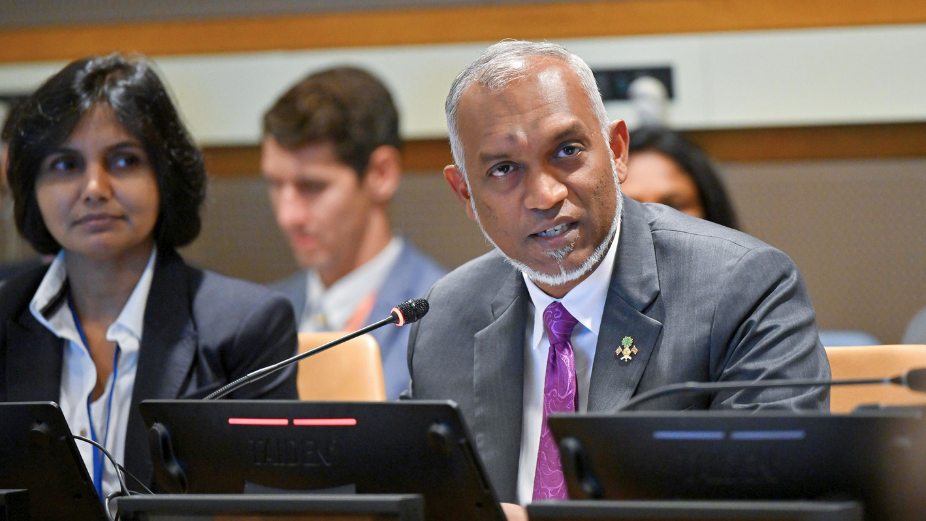
President Dr. Mohamed Muizzu has urged the international community to strengthen the connection between debt relief and climate finance to address the urgent challenges faced by Small Island Developing States (SIDS). Arriving in New York on Sunday to participate in the 79th session of the United Nations General Assembly (UNGA), the President made these remarks during the side event titled “Building Resilient Futures: The Global SIDS Debt Sustainability Support Service.”
As Co-Chair of the Strategic Advisory Group for the SIDS Debt Sustainability Support Service (DSSS), President Muizzu highlighted the ongoing struggles of SIDS with debt sustainability, emphasising their vulnerability to external economic shocks. “Over 40 percent of SIDS are already in, or nearing debt distress. The Maldives, like many of our fellow island nations, faces a debt-to-GDP ratio exceeding 100%,” he stated, stressing the need for immediate action. The president explained that the DSSS aims to provide a “holistic approach” to managing SIDS’ debt by creating fiscal space for essential areas such as climate adaptation and sustainable development.
President Muizzu proposed reallocating Special Drawing Rights (SDRs) through international financial institutions to enhance the financial resilience of SIDS. He emphasised the importance of partnerships with Multilateral Development Banks (MDBs) and International Financial Institutions (IFIs) to unlock investments and create new economic opportunities, thereby reducing SIDS’ exposure to external financial pressures.
He also called on SIDS to take ownership of their development by strengthening productive capacities, building robust institutions, and fostering collaboration between government and the private sector. Noting the necessity of economic diversification in an increasingly volatile global economy, he underscored the importance of implementing homegrown solutions to drive sustainable growth.
President Muizzu further advocated for aligning climate finance with debt relief, suggesting measures such as lower interest rates, extended repayment terms, and restructuring agreements. He remarked on the need for diversifying the economic bases of SIDS, which often depend heavily on tourism and fisheries, making them particularly vulnerable to external shocks like the COVID-19 pandemic. “Diversification is not merely a goal but a necessity for survival,” Muizzu asserted, encouraging SIDS to explore innovative financing tools, including blue and green bonds and debt-for-nature swaps.
Expressing optimism about the DSSS’s potential impact, President Muizzu stated that it could create fiscal space for development, enabling SIDS not only to survive but also to thrive in the long term.
In addition to the side event, President Muizzu’s UNGA agenda includes attending the “Summit of the Future” and delivering a lecture at Princeton University, where he will continue to advocate for the long-term financial and economic sustainability of SIDS.
This event marked President Muizzu’s first official engagement following his arrival in New York. The side event was co-chaired by the Governments of the Maldives, Antigua and Barbuda, and New Zealand, in collaboration with the International Institute for Environment and Development (IIED) and the SIDS Unit within the United Nations Department of Economic and Social Affairs (UN DESA)












